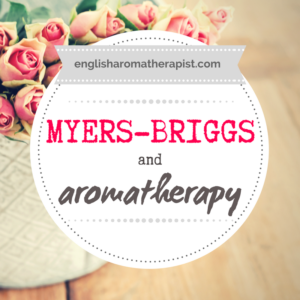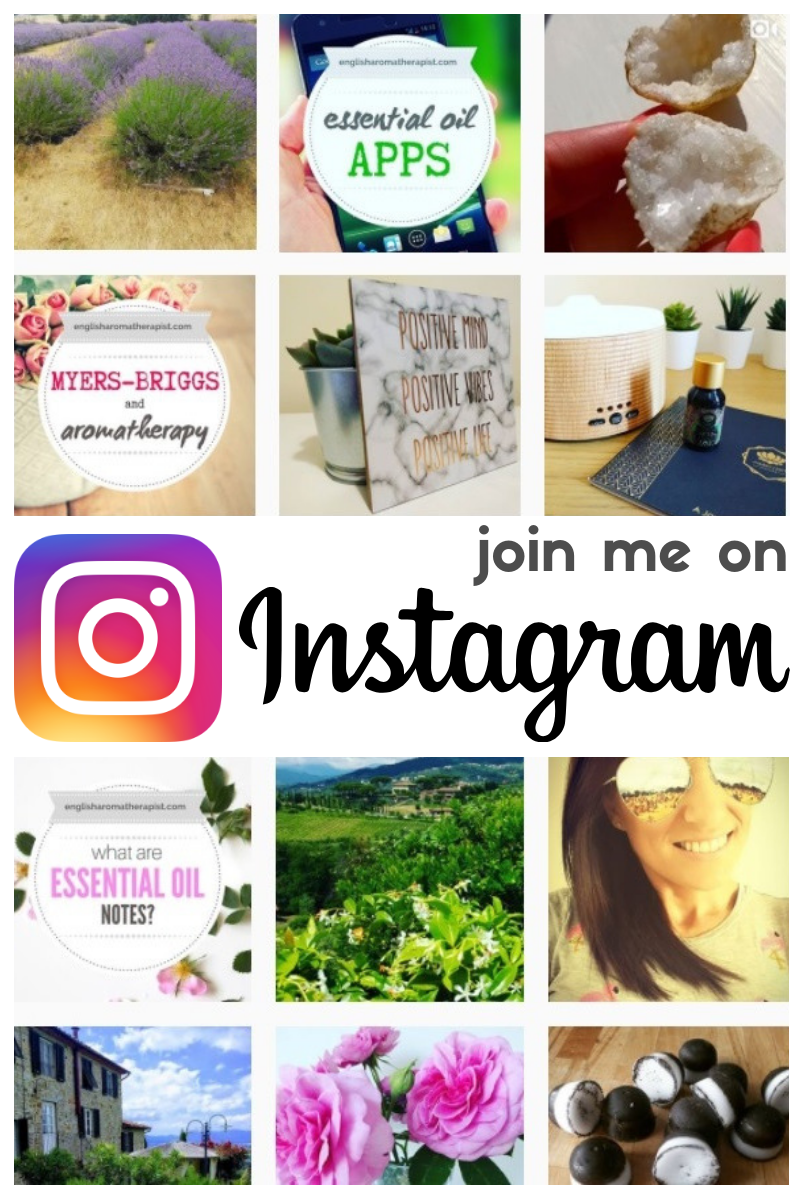Myers Briggs and Aromatherapy

What’s your Myers-Briggs type?
If you’re interested in pop-psychology, it’s very likely that you’ve come across the Myers-Briggs Type Indicator (MBTI). Even if you’re not interested, there’s a good chance you’ve ended up taking one of these personality tests in the workplace.
Each year over 2.5 million people take the MBTI quiz, making it the most widely used personality test in the world.
What is MBTI?
Essentially, MBTI is a personality test. Participants answer a range of questions designed to analyse the way we approach life, make decisions, relate to others and perceive our surroundings. It is named after Katharine Cook Briggs and her daughter Isabel Briggs Myers, who developed the concept during World War II.
Based on the theory of Carl Jung, MBTI is based on four dichotomies (or pairs) of characteristics. The test usually consists of 93 questions, requiring you to choose an answer that most closely matches your personality. The result is one of 16 personality “types”, based on a combination of four letters: E/I; S/N; T/F; J/P
But first…
Before we dive in, let me clarify: I’m not a psychologist or MBTI expert. This is simply my interpretation of Myers-Briggs, and why I believe it can be a useful tool for anyone interested in understanding people and relationships.
How do I take the test?
You can take the official Myers-Briggs test here, but there are several free copycat versions available online, such as Human Metrics and 16 Personalities. It’s worth mentioning that it’s important to answer honestly – not to choose the answer you wish you were, or think you should be.
Not convinced?
There are pros and cons to everything in life. Critics of MBTI tend to dismiss it for being overly vague or inaccurate. It’s possible to get a different result with a retest, and people can develop and shift types over time. The biggest criticism is that a four-letter code doesn’t account for the varied nuances of our individual character.
Clearly, human personality cannot neatly fit into 16 categories. So it’s important to recognise that tests like Myers-Briggs are just a general guideline. One ENFP will not be a clone of another ENFP. Essentially, it’s a starting-off point. As Valerie Worwood explains in The Fragrant Mind, “Personality classification is a trade-off between accuracy and mental overload”.
Nobody wants to be pigeonholed. But I do believe that tests like MBTI help us to understand each other better, which is ultimately beneficial. Have you ever felt frustrated because your friend is always late? Do you wish your partner enjoyed socialising as much as you do? Are you sometimes upset about the way other people make decisions? Tests like Myers-Briggs help to explain WHY people act the way they do. Less frustration, more empathy. That mum who stands on her own at the school gates isn’t rude or unfriendly – she’s probably just an introvert. Accepting people for who they are is so important. As a business, you can use this knowledge to your advantage (see below).

Which type is best?
There is no “right” and “wrong” when it comes to personality types. Although we live in a world that’s geared up for extroverts, there is nothing wrong with being an introvert. Everyone has their own idea of what it means to be “normal” – you might feel that most people are ESFJ, for example. Sure, some personality types are more common than others. But there’s no point trying to force yourself to be something you’re not.
Understanding your own Myers-Briggs type also helps YOU to be the best version of yourself. This doesn’t mean change yourself. You can choose to work on certain aspects, but you can’t fundamentally change your personality – and nor should you want to! To achieve true happiness, we need self-acceptance. It can be enlightening to understand why we act the way we do. Too often, we torment ourselves and feel, in some way, defective for not being the person we think we should be. Perhaps you’d prefer to be more socially confident, more organised and punctual, more rational with your decision-making… there are many traits that we’re led to believe are preferable to others. But, in reality, it takes all sorts to make a world.
Let’s use the analogy of crystals. We know that crystals are grouped into different types (quartz, selenite, fluorite, etc.) But each individual crystal is unique and beautiful in its own way. You can have 10 quartz crystals in a row, and they’ll all be slightly different. Yes, they all share the same properties of quartz, but they are not clones. The same can be applied to personality types. Not all ESFJs will be identical.
Understanding and accepting your personality (and the personalities of others) helps you to grow as a person. Being the best version of yourself is not about changing who you are. Imagine you’re a unique crystal that’s just becoming more and more polished and shiny! Eventually, you’ll realise where you fit in the gemstone collection.
Whatever your personality type, you have a role to play. We can’t all be world leaders! And what kind of a world would that be, if we were all the same? It’s about recognising your own strengths and weaknesses and then finding your niche. This is why I love sitting in my little office at home, writing articles just like this one! But ask me to host a training conference, and I’ll probably back away (slowly…into another room…to overthink it for a while!)
How does it relate to aromatherapy?
Understanding personality types is useful for anyone who works with PEOPLE. So, whether you’re an aromatherapist, a counsellor, a beauty therapist, a teacher, a salesperson…any job that requires communicating with different people.
If you work with clients, understanding personality types will help to improve your communication skills. Think about how you can adapt your service to suit different personalities. One of your primary objectives should be making your clients feel comfortable. A one-size-fits-all approach won’t work for everyone.
If you sell essential oils as part of a network marketing scheme, understanding personality types helps you tailor your sales approach for different customers. Not everyone wants to talk on the phone, not everyone feels comfortable at home-selling parties. Some people are more impulsive than others. Some will want to go away and analyse the information for a while. It can be hugely enlightening to understand the different ways people think, act, and make decisions.
In The Fragrant Mind, Valerie Worwood writes about aroma-psychology and the importance of understanding personality types when selecting essential oils to blend for a client. We know that our mental state impacts our physical health, so it makes sense that our choice of oils should align with our personality.

What do the letters mean?
At the end of this article, you’ll find links to some great resources where you can read about the Myers-Briggs Type Indicator and its 16 personality types in greater depth. In short, MBTI is based on four pairs of preferences. It’s not about fitting an exact mould, but establishing to which end of the spectrum you are closest.
Here’s a brief overview of the Myers-Briggs Type Indicator. For an accurate assessment, you’ll need to take the full test.
-
‘E’ or ‘I’
This is a spectrum of Extrovert (E) to Introvert (I). People are rarely one extreme but lie somewhere in the middle. Some people have more extrovert tendencies, some have more introvert tendencies. Often this is mistakenly thought to reflect how outgoing, sociable or shy a person is – actually, it’s about where you get your energy. Extroverts focus outwards and feel energised from socialising with others. Introverts are more inwardly focused, and need time alone to recharge and process their thoughts.
Here’s how I explain it: Imagine you’ve spent all day at a conference talking to people and taking part in social activities. By 6pm, what would you prefer to do?
a) Get together with friends/colleagues for dinner or drinks. You need to chat about your day and offload your experiences. Socialising helps you let your hair down and feel relaxed. Spending time with others makes you feel recharged.
or…
b) Head back to your hotel and spend the evening watching TV, reading a book, taking a quiet walk or doing a workout alone. Spending all day with others leaves you feeling a little drained, and you need some me-time to feel recharged.
If you’re in the former category, you’re probably more of an extrovert. But if you can relate to the latter, you’re probably more introverted.
-
‘S’ or ‘N’
This pair relates to how you perceive the world – Sensing (S) or Intuition (N). It’s not always obvious, but people tend to be closer to one than the other.
Are you focused on practical information, using your five senses to determine what’s going on around you? Are you more concerned with the here-and-now rather than daydreaming about future possibilities? Do you prefer to stick to the facts and talk about everyday life? This suggests you’re more S. You’re probably quite down-to-earth and not particularly interested in overanalysing personality types!
Or do you find yourself thinking about possibilities or abstract theories? Do you seek to find meanings and connections between things, and like to focus on the bigger picture? This means you’re more at the N end of the scale. As you walk down the street, you’re probably thinking about the future, pondering on life or lost in your imagination.
A good example is your chosen topic of conversation over dinner. Do you prefer to chat about real-life (e.g. traffic; house prices; TV shows) or are you more interested in getting deep? (e.g. time travel, the meaning of life, personality types….?!)
-
‘F’ or ‘T’
Do you make decisions with your heart or your head? A Feeling (F) type is strongly influenced by emotion, whereas a Thinking (T) type takes a more rational approach. It’s not related to intelligence or kindness – it’s about how you make decisions. If your decisions are based on logic, you’re probably more of a T person. But if your decisions are based on the feelings of those involved, you’ll be more on the F end of the scale.
Imagine you find a tatty old teddy bear in a cupboard upstairs. It’s years old, threadbare and you never use it. Would your instinct be to chuck it away? After all, it’s taking up space and serves no purpose. T types make rational decisions – and logic says it’s time for the bear to go.
Or would you feel a bit sorry for the bear as you watched it fall into the bin? Perhaps you feel you should keep it for sentimental value or in case you upset the person who gave it to you? If so, you’re more of an F type.
-
‘P’ or ‘J’
The final pair relates to how much you value structure, prior planning and organisation in your outer life. Perceivers (P) appear to be adaptable, flexible and more spontaneous. They tend to live their life on a looser schedule rather than rigidly adhering to plans. On the other hand, Judgers (J) feel more comfortable when things are orderly, pre-planned and well-organised.
Imagine you’re going away for the weekend. Do you:
a) Write a list and start packing a day or two before; fill the fuel tank in your car; shop for any supplies you need; check out the route online; research local sights and restaurants you want to visit; and leave the house on time!
or…
b) Pack just before you leave and buy supplies on the way. You’d rather keep your options open than commit to a particular restaurant or hotel – you want to keep things flexible. Choose your activities based on how you feel when you arrive. You planned to leave the house at 9am but 10.30 will do, right?

So…what’s your type? Let me know in the comments below!
Essential Oils and MBTI
So, just for fun…what essential oils do I think are related to Myers-Briggs types?
- E – Sweet Orange: Life and soul of the party! Vibrant and full of energy
- I – Bergamot: Understated power
- N – Clary Sage: Linked to the ‘third eye’ and intuition
- S – Frankincense: Spiritually grounding
- F – Rose: Quintessential aroma for the heart
- T – Rosemary: Mental clarity
- J – Basil: Proactive and awakening
- P – Patchouli: Chill out and go with the flow, man!
Further reading:
- MBTI Online
- 16 Personality Types
- MyersBriggs.Org
- Myers-Briggs Type Indicator – Wikipedia
- The Fragrant Mind (1995) Valerie Worwood
What to Read Next: The Little Book for Aromatherapists
Follow me on...
Share this on...
